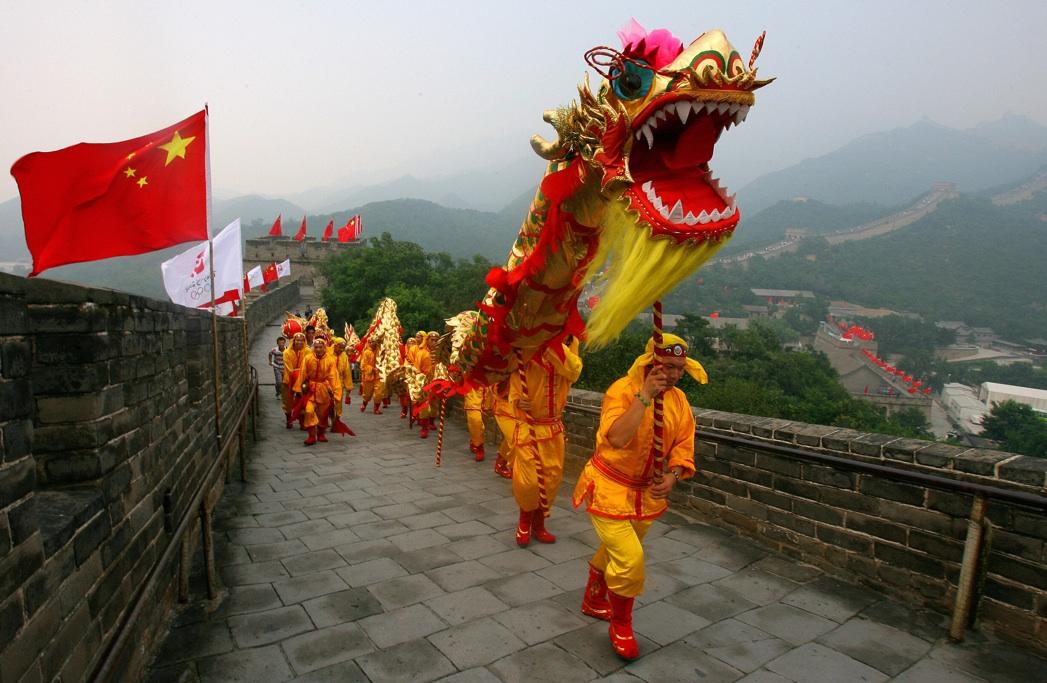China’s economy: Enter the dragon
Dancers perform a dragon dance on the Great Wall in Badaling, China, about 50 miles north of Beijing on August 5, 2008.
One of the most important — and fascinating — questions in global economics right now involves China's burgeoning consuming class.
Just how will this teeming land of 1.3 billion people develop and, more specifically, what will all these people do with their rising incomes?
It's not a trivial question.
This outcome in China will determine corporate strategies worldwide. It will kill off some businesses, and create new corporate empires. It will also affect everything from cultural patterns, to energy prices, to diplomatic relations with Beijing to — not insignificantly — the serious environmental impact of a billion or so people constantly making, consuming, and discarding stuff.
So if you're interested in this question (and, yes, you should be), then head over to the always interesting Economix blog on the New York Times, where David Barboza has just posted a fascinating Q&A with Karl Gerth, an Oxford University history professor and author of the book "As China Goes, So Goes the World."
The point? Yes, Chinese consumers are critical to the future of the world. But here's the problem: Nobody really knows how all of this is going to play out.
“Nobody fully understands just what they might be sowing, for the Chinese or for the rest of the globe, by continuing to insist that the Chinese consume more and more," Gerth writes in the book.
Barboza asks the professor all the right questions. Here's a quick sampling:
Is China really shifting to a consumer-oriented society?
Gerth: Undoubtedly. Take advertising alone, which is a defining feature of living in a consumer-oriented society. The political slogans of the Mao era have been largely replaced over the past few decades with advertisements. Now advertisements are ubiquitous. I’ve even encountered LCDs blasting me with ads in toilet stalls, cabs and elevators.
As with so much in China, the transformation has been both dramatic and rapid. China’s ad market has grown by 40 percent a year over the last two decades; some reports expect China to replace the United States as the world’s largest ad market as soon as 2020. Nearly all Chinese, rich and poor, have access to TVs and the advertising that comes with it. So even the poor are aware of all the new products and services spreading in China.
What about rising inequality in China?
Gerth: Clearly, hundreds of millions of Chinese are still desperately poor. But hundred of millions have begun to adopt all or some aspects of middle-class lifestyles — from bigger homes stocked with the latest electronic appliances to private cars to modest vacations. These Chinese have begun to lead consumer lifestyles similar to their counterparts in other countries.
The question remains, though, whether China can create a middle class as broad as the United States did after World War II. Or will China continue to create a two-tier society: an elite with resources to consume unlimited luxury goods and vast majority living on much less? Of course, this isn’t just a question for China but many countries, including the United States, where all statistics indicate the country, ironically, is heading in the opposite direction from the one global business and political leaders want to see in China, away from having a broad middle class.
How will China's rise reshape the global economy?
Gerth: There will be many positives, especially from the point of view of consumers. Chinese brand building could lead to the creation of dozens of new Sonys and Googles. They also lead to cheaper prices for things intended for both the China and foreign markets. Indeed, China may continue to shift its manufacturing prowess and aid the transition away from nonrenewable energy sources and the consumer goods like gas-driven cars that rely on them, leading the way to the post-carbon economy and society even as it continues to emit the most carbon.
While the potential benefits are nice to contemplate, I think the downsides also require attention. Chinese markets may become more like Western ones. But the reverse is also true. Rather than China increasingly protecting the intellectual property like the brand integrity of multinationals, perhaps counterfeits manufactured in China and exported globally will undermine global brands and consumerism itself. This is happening. Even as retailing and branding have been encouraging much more consumption in China, consumer confidence (both nationally and internationally) has been undermined by the massive production of Chinese counterfeits.
The brainy conversation reminds me of two cliches you hear while traveling through China, especially with business leaders or economists.
The first is attributed to Napoleon Bonaparte: "Let China sleep, for when the dragon awakes, she will shake the world."
The second — attributed to just about every business executive I've ever interviewed in China — may be more useful when trying to determine this uncertain future: "In China, anything is possible. Nothing is easy."
Every day, reporters and producers at The World are hard at work bringing you human-centered news from across the globe. But we can’t do it without you. We need your support to ensure we can continue this work for another year.
Make a gift today, and you’ll help us unlock a matching gift of $67,000!
